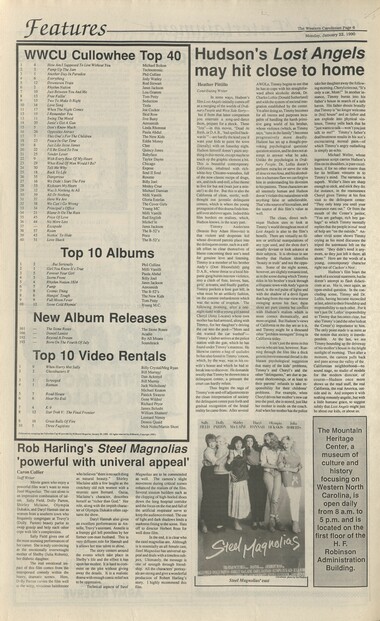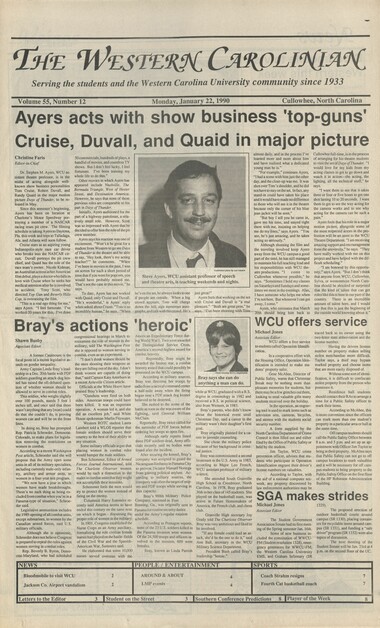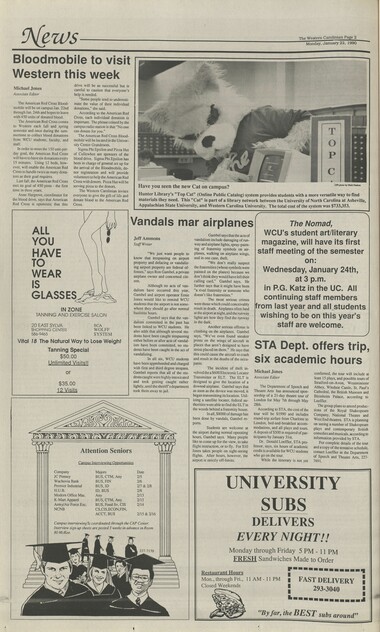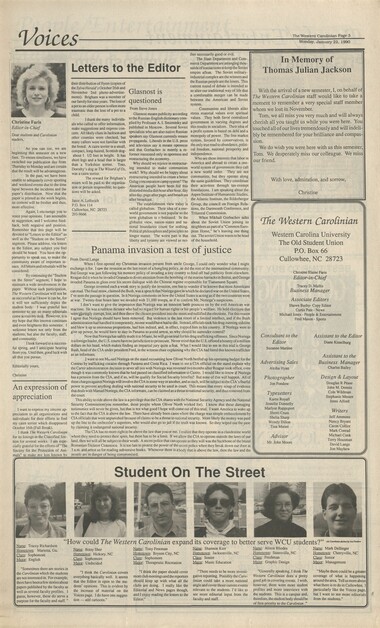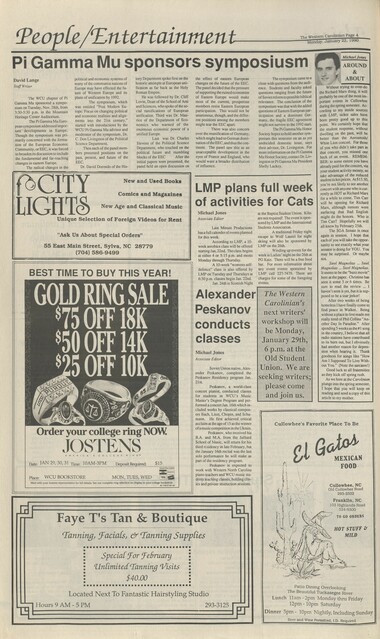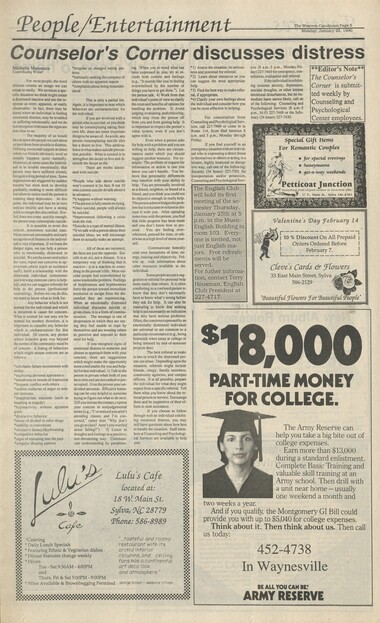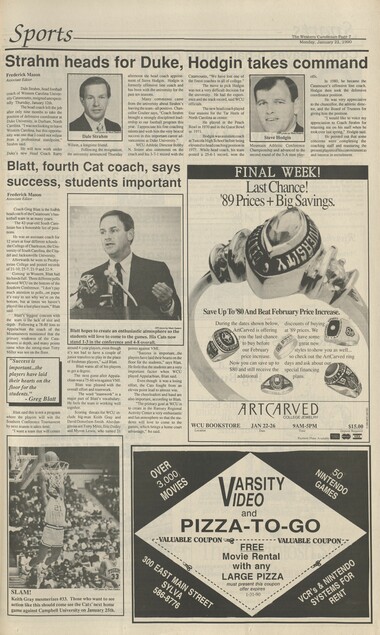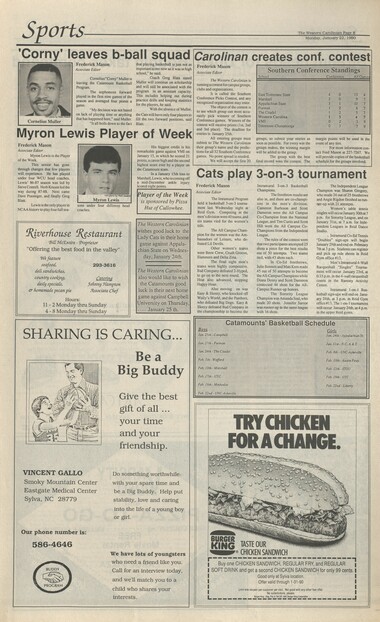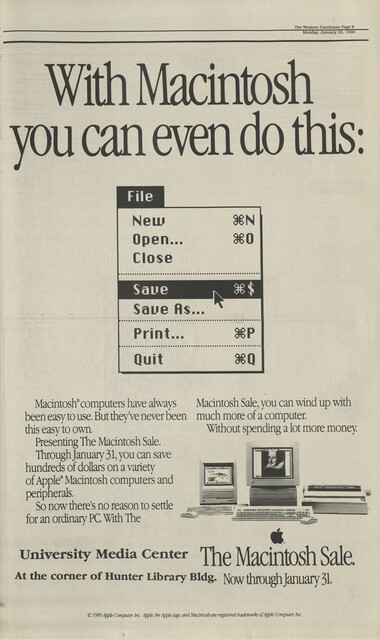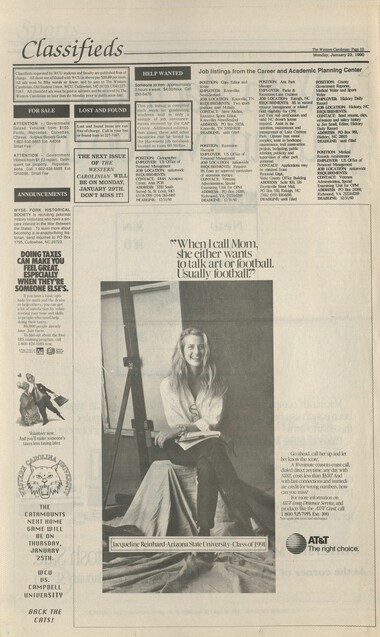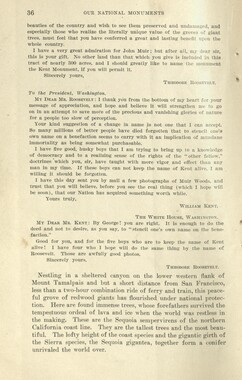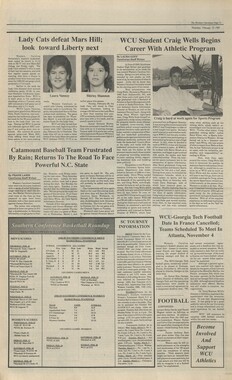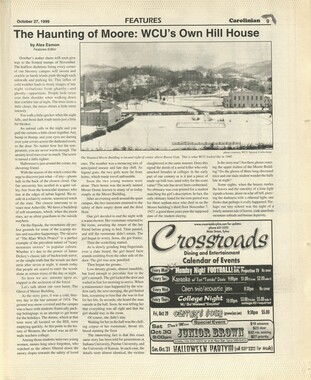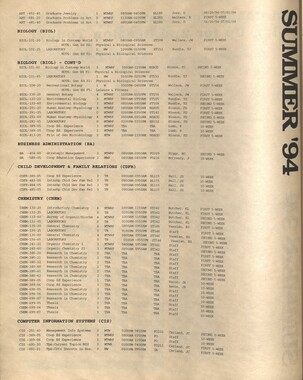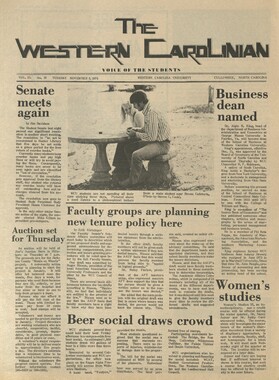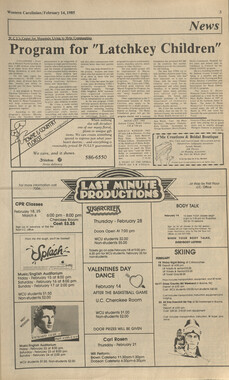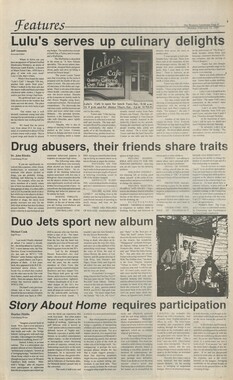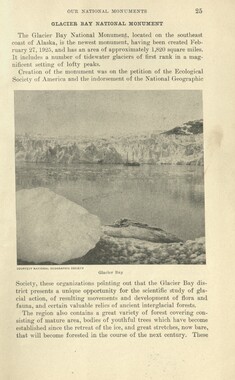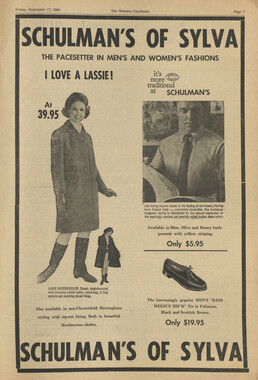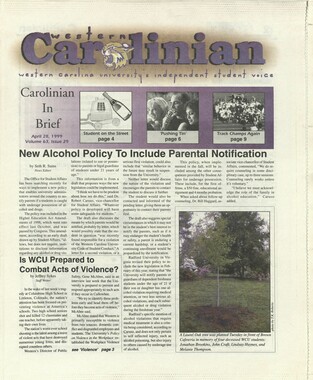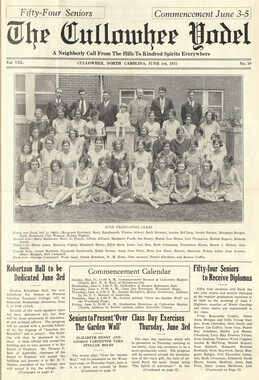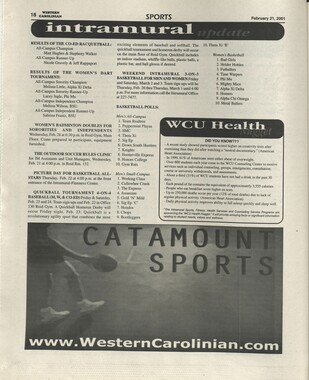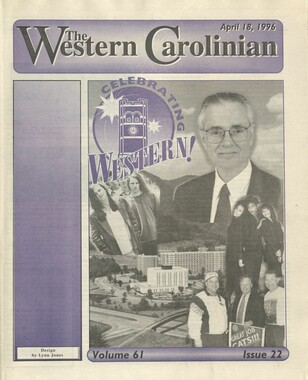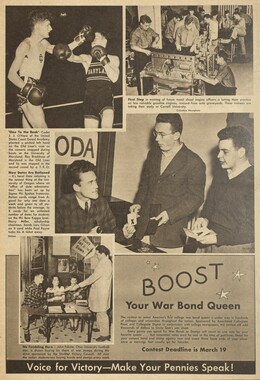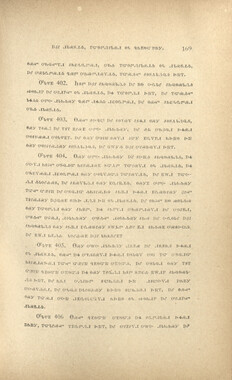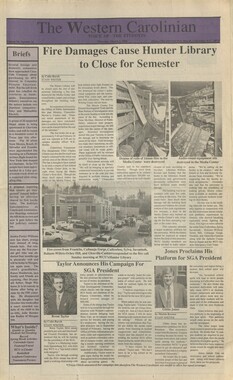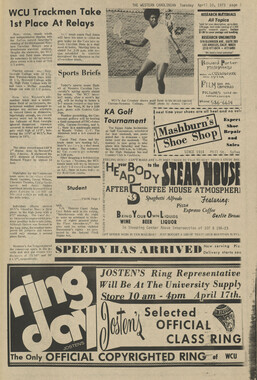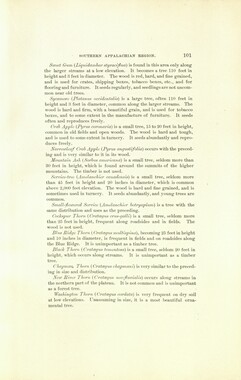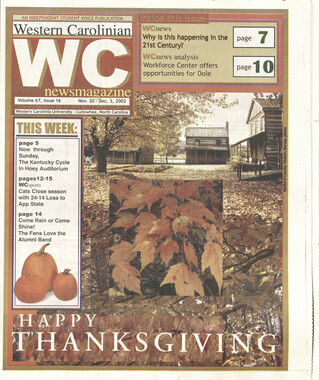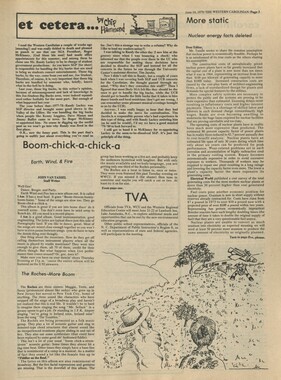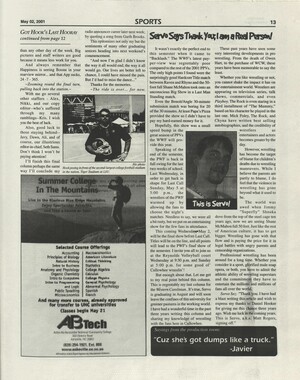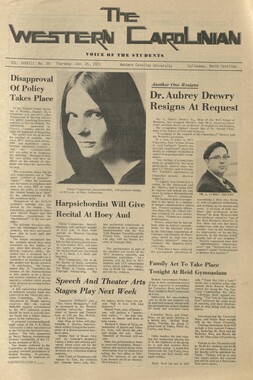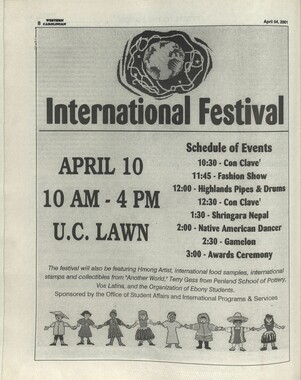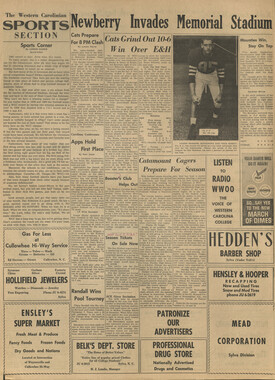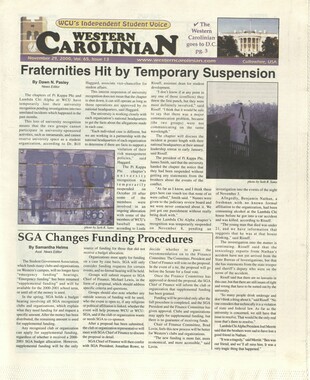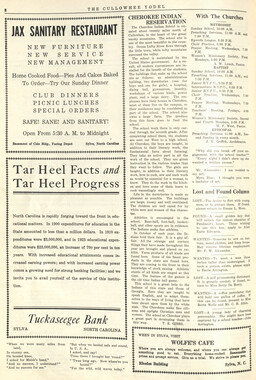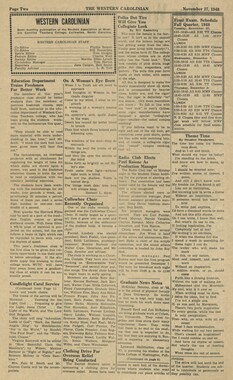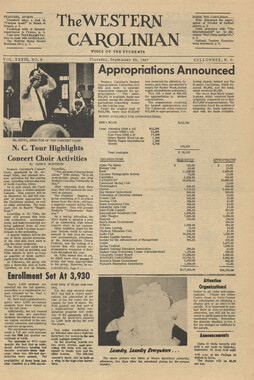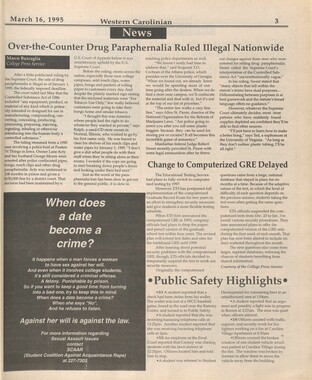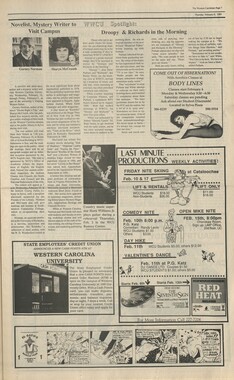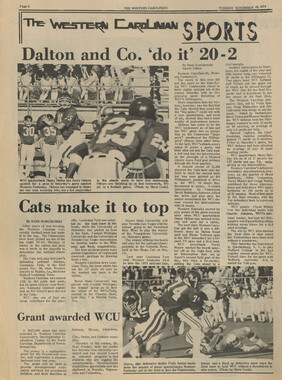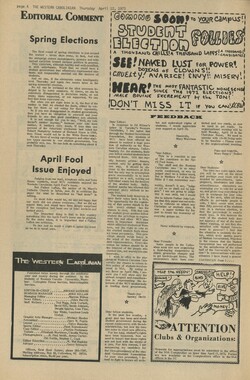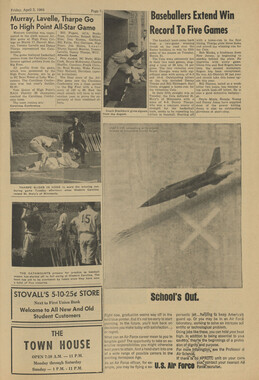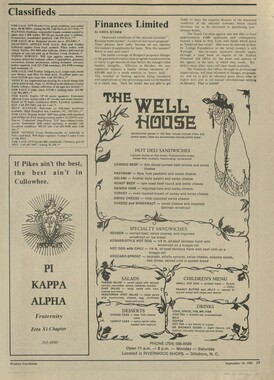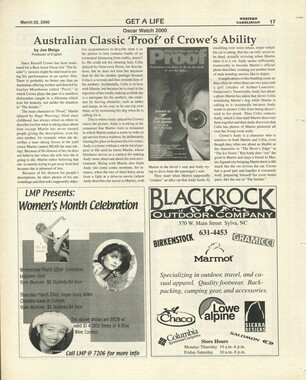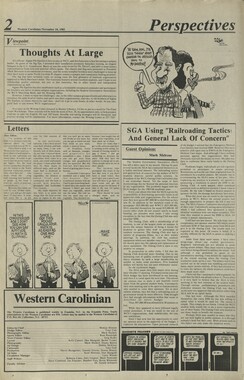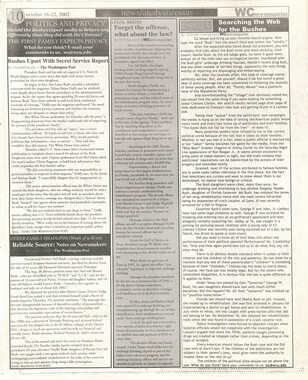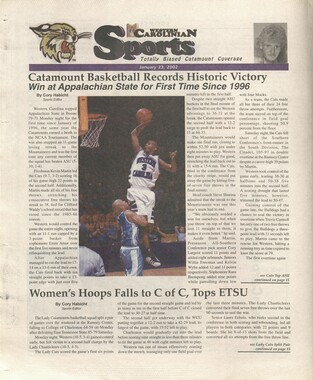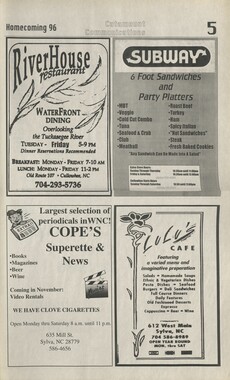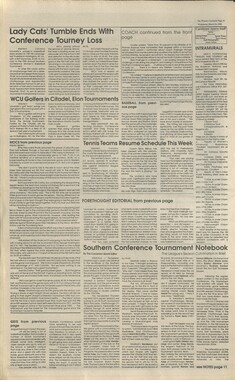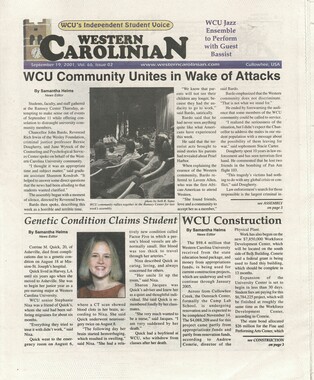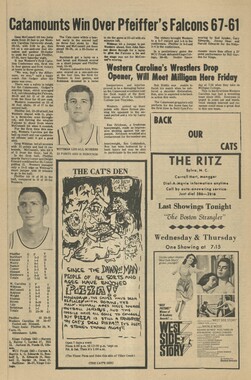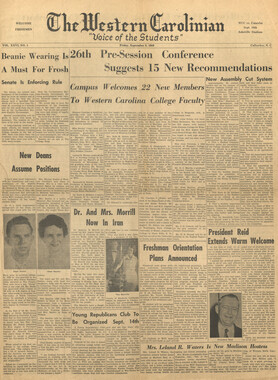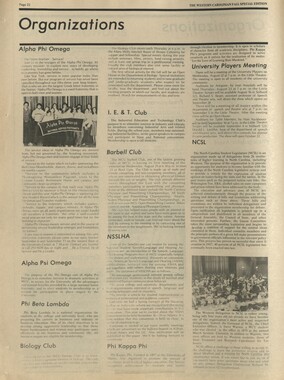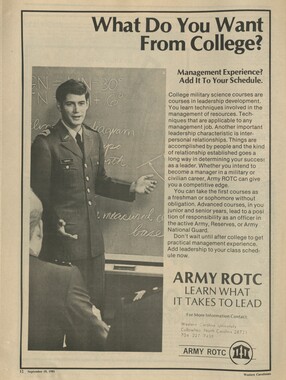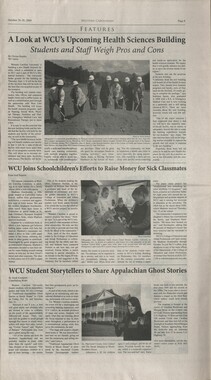Western Carolina University (20)
View all
- Canton Champion Fibre Company (2308)
- Cherokee Traditions (291)
- Civil War in Southern Appalachia (165)
- Craft Revival (1942)
- Great Smoky Mountains - A Park for America (2946)
- Highlights from Western Carolina University (430)
- Horace Kephart (941)
- Journeys Through Jackson (159)
- LGBTQIA+ Archive of Jackson County (85)
- Oral Histories of Western North Carolina (314)
- Picturing Appalachia (6873)
- Stories of Mountain Folk (413)
- Travel Western North Carolina (160)
- Western Carolina University Fine Art Museum Vitreograph Collection (129)
- Western Carolina University Herbarium (92)
- Western Carolina University: Making Memories (738)
- Western Carolina University Publications (2488)
- Western Carolina University Restricted Electronic Theses and Dissertations (146)
- Western North Carolina Regional Maps (71)
- World War II in Southern Appalachia (131)
University of North Carolina Asheville (6)
View all
- Western Carolina College (199)
- Western Carolina Teachers College (239)
- Western Carolina University (1973)
- Allanstand Cottage Industries (0)
- Appalachian National Park Association (0)
- Bennett, Kelly, 1890-1974 (0)
- Berry, Walter (0)
- Brasstown Carvers (0)
- Cain, Doreyl Ammons (0)
- Carver, George Washington, 1864?-1943 (0)
- Cathey, Joseph, 1803-1874 (0)
- Champion Fibre Company (0)
- Champion Paper and Fibre Company (0)
- Cherokee Indian Fair Association (0)
- Cherokee Language Program (0)
- Crittenden, Lorraine (0)
- Crowe, Amanda (0)
- Edmonston, Thomas Benton, 1842-1907 (0)
- Ensley, A. L. (Abraham Lincoln), 1865-1948 (0)
- Fromer, Irving Rhodes, 1913-1994 (0)
- George Butz (BFS 1907) (0)
- Goodrich, Frances Louisa (0)
- Grant, George Alexander, 1891-1964 (0)
- Heard, Marian Gladys (0)
- Kephart, Calvin, 1883-1969 (0)
- Kephart, Horace, 1862-1931 (0)
- Kephart, Laura, 1862-1954 (0)
- Laney, Gideon Thomas, 1889-1976 (0)
- Masa, George, 1881-1933 (0)
- McElhinney, William Julian, 1896-1953 (0)
- Niggli, Josephina, 1910-1983 (0)
- North Carolina Park Commission (0)
- Osborne, Kezia Stradley (0)
- Owens, Samuel Robert, 1918-1995 (0)
- Penland Weavers and Potters (0)
- Rhodes, Judy (0)
- Roberts, Vivienne (0)
- Roth, Albert, 1890-1974 (0)
- Schenck, Carl Alwin, 1868-1955 (0)
- Sherrill's Photography Studio (0)
- Smith, Edward Clark (0)
- Southern Highland Handicraft Guild (0)
- Southern Highlanders, Inc. (0)
- Stalcup, Jesse Bryson (0)
- Stearns, I. K. (0)
- Thompson, James Edward, 1880-1976 (0)
- United States. Indian Arts and Crafts Board (0)
- USFS (0)
- Vance, Zebulon Baird, 1830-1894 (0)
- Weaver, Zebulon, 1872-1948 (0)
- Western Carolina University. Mountain Heritage Center (0)
- Whitman, Walt, 1819-1892 (0)
- Wilburn, Hiram Coleman, 1880-1967 (0)
- Williams, Isadora (0)
- 1920s (57)
- 1930s (69)
- 1940s (114)
- 1950s (66)
- 1960s (314)
- 1970s (599)
- 1980s (406)
- 1990s (379)
- 2000s (282)
- 2010s (175)
- 1600s (0)
- 1700s (0)
- 1800s (0)
- 1810s (0)
- 1820s (0)
- 1830s (0)
- 1840s (0)
- 1850s (0)
- 1860s (0)
- 1870s (0)
- 1880s (0)
- 1890s (0)
- 1900s (0)
- 1910s (0)
- 2020s (0)
- Jackson County (N.C.) (2463)
- Appalachian Region, Southern (0)
- Asheville (N.C.) (0)
- Avery County (N.C.) (0)
- Blount County (Tenn.) (0)
- Buncombe County (N.C.) (0)
- Cherokee County (N.C.) (0)
- Clay County (N.C.) (0)
- Graham County (N.C.) (0)
- Great Smoky Mountains National Park (N.C. and Tenn.) (0)
- Haywood County (N.C.) (0)
- Henderson County (N.C.) (0)
- Knox County (Tenn.) (0)
- Knoxville (Tenn.) (0)
- Lake Santeetlah (N.C.) (0)
- Macon County (N.C.) (0)
- Madison County (N.C.) (0)
- McDowell County (N.C.) (0)
- Mitchell County (N.C.) (0)
- Polk County (N.C.) (0)
- Qualla Boundary (0)
- Rutherford County (N.C.) (0)
- Swain County (N.C.) (0)
- Transylvania County (N.C.) (0)
- Watauga County (N.C.) (0)
- Waynesville (N.C.) (0)
- Yancey County (N.C.) (0)
- Newsletters (510)
- Publications (documents) (1978)
- Aerial Photographs (0)
- Aerial Views (0)
- Albums (books) (0)
- Articles (0)
- Artifacts (object Genre) (0)
- Bibliographies (0)
- Biography (general Genre) (0)
- Cards (information Artifacts) (0)
- Clippings (information Artifacts) (0)
- Copybooks (instructional Materials) (0)
- Crafts (art Genres) (0)
- Depictions (visual Works) (0)
- Design Drawings (0)
- Drawings (visual Works) (0)
- Envelopes (0)
- Exhibitions (events) (0)
- Facsimiles (reproductions) (0)
- Fiction (general Genre) (0)
- Financial Records (0)
- Fliers (printed Matter) (0)
- Glass Plate Negatives (0)
- Guidebooks (0)
- Internegatives (0)
- Interviews (0)
- Land Surveys (0)
- Letters (correspondence) (0)
- Manuscripts (documents) (0)
- Maps (documents) (0)
- Memorandums (0)
- Minutes (administrative Records) (0)
- Negatives (photographs) (0)
- Newspapers (0)
- Notebooks (0)
- Occupation Currency (0)
- Paintings (visual Works) (0)
- Pen And Ink Drawings (0)
- Periodicals (0)
- Personal Narratives (0)
- Photographs (0)
- Plans (maps) (0)
- Poetry (0)
- Portraits (0)
- Postcards (0)
- Programs (documents) (0)
- Questionnaires (0)
- Relief Prints (0)
- Sayings (literary Genre) (0)
- Scrapbooks (0)
- Sheet Music (0)
- Slides (photographs) (0)
- Songs (musical Compositions) (0)
- Sound Recordings (0)
- Specimens (0)
- Speeches (documents) (0)
- Text Messages (0)
- Tintypes (photographs) (0)
- Transcripts (0)
- Video Recordings (physical Artifacts) (0)
- The Reporter, Western Carolina University (510)
- WCU Students Newspapers Collection (1920)
- A.L. Ensley Collection (0)
- Appalachian Industrial School Records (0)
- Appalachian National Park Association Records (0)
- Axley-Meroney Collection (0)
- Bayard Wootten Photograph Collection (0)
- Bethel Rural Community Organization Collection (0)
- Blumer Collection (0)
- C.W. Slagle Collection (0)
- Canton Area Historical Museum (0)
- Carlos C. Campbell Collection (0)
- Cataloochee History Project (0)
- Cherokee Studies Collection (0)
- Daisy Dame Photograph Album (0)
- Daniel Boone VI Collection (0)
- Doris Ulmann Photograph Collection (0)
- Elizabeth H. Lasley Collection (0)
- Elizabeth Woolworth Szold Fleharty Collection (0)
- Frank Fry Collection (0)
- George Masa Collection (0)
- Gideon Laney Collection (0)
- Hazel Scarborough Collection (0)
- Hiram C. Wilburn Papers (0)
- Historic Photographs Collection (0)
- Horace Kephart Collection (0)
- Humbard Collection (0)
- Hunter and Weaver Families Collection (0)
- I. D. Blumenthal Collection (0)
- Isadora Williams Collection (0)
- Jesse Bryson Stalcup Collection (0)
- Jim Thompson Collection (0)
- John B. Battle Collection (0)
- John C. Campbell Folk School Records (0)
- John Parris Collection (0)
- Judaculla Rock project (0)
- Kelly Bennett Collection (0)
- Love Family Papers (0)
- Major Wiley Parris Civil War Letters (0)
- Map Collection (0)
- McFee-Misemer Civil War Letters (0)
- Mountain Heritage Center Collection (0)
- Norburn - Robertson - Thomson Families Collection (0)
- Pauline Hood Collection (0)
- Pre-Guild Collection (0)
- Qualla Arts and Crafts Mutual Collection (0)
- R.A. Romanes Collection (0)
- Rosser H. Taylor Collection (0)
- Samuel Robert Owens Collection (0)
- Sara Madison Collection (0)
- Sherrill Studio Photo Collection (0)
- Smoky Mountains Hiking Club Collection (0)
- Stories of Mountain Folk - Radio Programs (0)
- Venoy and Elizabeth Reed Collection (0)
- WCU Gender and Sexuality Oral History Project (0)
- WCU Mountain Heritage Center Oral Histories (0)
- WCU Oral History Collection - Mountain People, Mountain Lives (0)
- Western North Carolina Tomorrow Black Oral History Project (0)
- William Williams Stringfield Collection (0)
- Zebulon Weaver Collection (0)
- College student newspapers and periodicals (1948)
- African Americans (0)
- Appalachian Trail (0)
- Artisans (0)
- Cherokee art (0)
- Cherokee artists -- North Carolina (0)
- Cherokee language (0)
- Cherokee pottery (0)
- Cherokee women (0)
- Church buildings (0)
- Civilian Conservation Corps (U.S.) (0)
- Dams (0)
- Dance (0)
- Education (0)
- Floods (0)
- Folk music (0)
- Forced removal, 1813-1903 (0)
- Forest conservation (0)
- Forests and forestry (0)
- Gender nonconformity (0)
- Great Smoky Mountains National Park (N.C. and Tenn.) (0)
- Hunting (0)
- Landscape photography (0)
- Logging (0)
- Maps (0)
- Mines and mineral resources (0)
- North Carolina -- Maps (0)
- Paper industry (0)
- Postcards (0)
- Pottery (0)
- Railroad trains (0)
- Rural electrification -- North Carolina, Western (0)
- School integration -- Southern States (0)
- Segregation -- North Carolina, Western (0)
- Slavery (0)
- Sports (0)
- Storytelling (0)
- Waterfalls -- Great Smoky Mountains (N.C. and Tenn.) (0)
- Weaving -- Appalachian Region, Southern (0)
- Wood-carving -- Appalachian Region, Southern (0)
- World War, 1939-1945 (0)
- Text (2488)
- MovingImage (0)
- Sound (0)
- StillImage (0)
Western Carolinian Volume 55 Number 12
Item
Item’s are ‘child’ level descriptions to ‘parent’ objects, (e.g. one page of a whole book).
-
-
features The Western Carolinian Page 6 Monday. January 22. 1990 WWCU Cullowhee Top 40 1 4 How Am I Supposed To Live Without You 2 3 Pump Up The Jam 3 1 Another Day In Paradise 4 6 Everything 5 12 Downtown Train 6 2 Rhythm Nation 7 10 Just Between You And Me 8 13 Free Fallin' 9 15 Two To Make It Right 10 14 Love Song 11 17 When The Night Comes 12 19 I Remember You 13 11 Swing The Mood 14 20 Janie's Got A Gun 15 5 Don't Know Much 16 26 Opposite s Attract 17 7 This One's For The Children 18 23 Peace In Our Time 19 8 Just Like Jesse James 20 22 I'11 Be Good To You 21 25 Tender Lover 22 9 With Every Beat Of My Heart 23 29 What Kind Of Man Would I Be? 24 30 Tell Me Why 25 18 Back To Life 26 35 Dangerous 27 16 We Didn't Start The Fire 28 33 Kickstart My Heart 29 32 Was It Nothing At All 30 39 All Or Nothing 31 37 Here We Are 32 38 We Can't Go Wrong 33 34 Principal's Office 34 21 Blame It On The Rain 35 45 Price Of Love 36 44 No More Lies 37 — Escapade 38 57 Roam 39 43 Nothin To Hide 40 31 Love Shack Michael Bolton Technotronic Phil Collins Jody Watley Rod Stewart Janet Jackson Lou Gramm Tom Petty Seduction Tesla Joe Cocker Skid Row Jive Buny Aerosmith Linda Rhonstat Paula Abdul The New Kids Eddie Money Cher Quincy Jones Babyface Taylor Dayne Chicago Expose Soul II Soul Roxette Billy Joel Motley Crue Michael Damian Milli Vanilli Gloria Estefan The Cover Girls Young MC Milli Vanilli Bad English Michel'le Janet Jackson The B-52's Poco The B-52's Top 10 Albums 1 2 2 1 ... But Seriously Girl You Know It's True 3 5 Forever Your Girl 4 3 Storm Front 5 6 7 8 9 4 7 8 6 9 Rhythm Nation 1814 Pump Cosmic Thing Hangin' Tough Full Moon Fever 10 12 Stone Cold Rhymin' Phil Collins Milli Vanilli Paula Abdul Billy Joel Janet Jackson Aerosmith The B-52's The New Kids Tom Petty Young M.C. New Album Releases 161 166 192 193 The Stone Roses Daniel Lanios Beyond A Dream Born On The Fourth Of July The Stone Roses Acadie By All Means Soundtrack Top 10 Video Rentals 9 10 9 When Harry Met Sally 2 Ghostbusters II 3 Scrooged 1 Batman 1 Road House 6 Hear No Evil 4 K-9 12 Star Trek V: The Final Frontier 16 Great Balls Of Fire 5 Three Fugitives Billy Crystal/Meg Ryan Bill Murray/ Dan Ackroyd Bill Murray Jack Nicholson/ Michael Keaton Patrick Swayze Gene Wilder/ Richard Pryor James Belushi William Shatner/ Leonard Nimoy Dennis Quaid Nick Nolte/Martin Short (Information, excepting the Cullowhee Top 40 provided by Billboard Magaiint. January 20, 1990. All righta reserved by BiiH><xir»j'._Copyright 1990.) Rob Harling's Steel Magnolias 'powerful with univeral appeal' Caron Collier Staff Writer Movie goers who enjoy a powerful film won't want to miss Steel Magnolias. The cast alone is an impressive combination of talent. Sally Field, Dolly Parton, Shirley Mclaine, Olympia Dukakis, and Daryl Hannah star as women from a southern town who frequently congregate at Truvy's (Dolly Parton) beauty parlor to swap gossip and help each other cope with life's complexities. Sally Field gives one of the most stunning performances of her career. She is truly convincing as the emotionally overwrought mother of Shelby (Julia Roberts), her diabetic daughter. The real emotional impact of this film comes from the interspersed comedy within the heavy, dramatic scenes. Here, Dolly Parton carries the film well as the witty, vivacious hairdresser who believes "there is no such thing as natural beauty." Shirley Maclaine adds a few laughs as the crotchety old rich women with a neurotic saint Bernard. Ouisa, Maclaine's character, describes herself as "richer than God." Her role, along with the impish character of Olympia Dukakis often captures the show. Daryl Hannah also gives an excellent performances as An- nelle, Truvy's assistant. Annelleis a frumpy girl left penniless by her former con-man husband. This is very different role for Hannah and it allows her true talent to shine. The story centers around the events which take place in Shelby's life and the effect it has upon her mother. It is hard to comment on the plot without giving away the details. It is a realistic drama wilh enough comic relief not to be oppressive. Technical aspects of Steel Magnolias are to be commended as well. The camera's slight movement during critical scenes enhanced the realism of the film. Several tension builders such as the clopping of high-heeled shoes down the long hospital corridor and the focus on the rise and fall of the artificial respirator serve to keep the audience riveted. The use of light and dark shadows lends a starkness fitting to the scene. Hats off to director Herbert Ross for well done film. In the end, it is clear who the steel magnolias are. Although is is essentially an all female cast, Steel Magnolias has universal appeal and deals with a timeless subject. Ultimately, the message is one of strength through friendship. All the characters' portrayals are strong and give a wonderful production of Robert Harling's story. I highly recommend this film. Hudson's Lost Angels may hit close to home Heather Pittillo Contributing Writer In some ways, Hudson's film Lost Angels initially comes off as a merging of the worlds of Ordinary People and West Side Story— but if from that latter comparison you entertain a song-and-dance them, prepare for a shock. These "Jets"—in this movie, "Dead At Birth, or D.A.B., 'bad spelled back- wards'"—are hardly the kind you'd want your kids to paint the town (literally) with on Saturday night. Hudson himself doesn't paint anything in this movie, except maybe to touch up the graphic element a bit. This is beautiful contemporary California, inhabited with rich- white-boy Chicano-wannabes, full of the now-classic recipe of drugs, sex, and rock-and-roll, a fine theme to live for but not (wait just a minute!) to die for. But this is also the California of clean, sterile, well- thought out juvenile delinquent centers, which is where the young protagonist of this drama finds himself over and over again. Indeed this film borders on realism, which, Hudson knows, is the scary part. Timmy Anderson (Beastie Boy Adam Horovitz) is that violent and desperate kid whose divorced parents place into the delinquent center, each in a selfish effort to clear themselves of blame concerning their son's need for genuine love and listening. Timmy is a member of his brother Andy's (Don Bloomfield) gang D.A.B., whose threat to a local his- panic gang bursts into raw violence, into a clash of fists, knives, bats, girls' screams, and finally gunfire. Timmy pockets a lone gun left, in what must be an unlikely fashion, on the cement embankment which was the scene of eruption. The following morning, after a one- night stand with a young girl named Cheryl (Amy Locane) whose own mother has had arrested, along with Timmy, for her daughter's driving the car into the pool—"Mom said she wanted the car washed"— Timmy's father arrives at the police station with the gun, which he has found under Timmy's mattress. He likewise carries a bag of qualudes he has also found in Timmy's room, which, by the way, was in his ex- wife's house and which he had to break into to discover. He demands noisily that Timmy be thrown into a delinquent center, a pressure the court can hardly refute. Thus begins the saga of Timmy's on-and-off adjustments to the clean interpretation of society the delinquent center puts forth and gradual recognition of the brutal reality he came from. After several AWOLs, Timmy begins to see that he has to cope with his straightforward albeit alcoholic shrink, Dr. Charles Loftis (Donald Sutherland) and with the system of societal integration established by the center. Yet after doing so, Timmy becomes for all intents and purposes incapable of handling the harsh primitive gang world of his brother, whose violence (which, as Timmy says, "runs in the family") becomes progressively more deadly. Hudson has set up a thought-provoking psychological question/ question session, and he does not attempt to answer what he asks. Unlike the psychologist in Ordinary People, Dr. Loftis doesn't perform miracles or serve the role of deus ex machina, and his alcoholism is a humane flaw we can forgive him in understanding his devotion to his patients. These characters are all intensely human and Hudson doesn' t violate this naturalness with anything false or unbelievable. That's the source of his realism, and the source of this film's value as well. The clean, direct technique Hudson uses to look at Timmy's world throughout most of Lost Angels is also to the film's benefit. There are virtually no filters or artificial manipulations of any type used, and the shots don't usually deviate or look askance at their subjects. It is obvious to see thereby that Hudson identifies 'beauty in truth' and not the opposite. Some of the night scenes, however, are slightly romanticized, as in the scene during which Timmy rides in his brother's truck through a Hispanic town with Andy' s gun in hand, in the red pulse of lights and with the shadow of a devil figure that hang from the rear-view mirror swinging across his face; these shots are pure cinema but conflict with Hudson's realism which is more correct thematically, and more original. But Hudson's views of California in the day are as it is, and Timmy might be a thousand other "problem teenagers" living in California today. It isn't just the teens in this movie who are lost, however. Running through the film like a thick genetic/environmental thread is the blatant psychological suggestion that many of the kids' problems, Timmy's and Cheryl's and the other "delinquents," are due to parental shortcomings, or at least to their parents' refusals to take responsibility for their childrens' problems. For example, when Cheryl drives her mother's new car into the pool, she is stoned, just like her mother is inside on the couch. And when her mother has the police \ifh Ifcilh Miirlm \teml i,\m\m him iir.b v\mm mtAvsi hvsnui i*to\ktt mmms take her daughter away the following morning, Cheryl cries out, "It's only a car, Mom!" In another instance, Timmy bursts into his father's house in search of a safe haven. His father shouts brutally that Timmy is "no longer welcome in [his] house" and as father and son explode into physical violence, Timmy yells back that he "just wants to talk—won't you just talk to me?" Timmy's father's deaf/muteness results in his son's excruciating mental pain—of which Timmy's angry outlashing is simply an echo. Michael Weller, whose ingenious script carries Hudson's film on its shoulders, is pure excellence, if for no other reason than for its brilliant ventures in to Timmy's mind. The narration is superb. Weller's lines are sharp enough to stick, and stick they do; for instance, in the reassurance Cheryl gives Timmy at his first visit to the delinquent center: "They only keep you until your insurance runs out." Or from the mouth of the Center's janitor, "You are garbage, rich boy garbage" to which Timmy mentally replies that the people in rea/ need of help are "on the outside." Another vivid scene shows Timmy crying as his mind discusses the tripod the astronauts left on the moon: "they didn't need it anymore, so they just left it there, all alone." Here are the words of a young, contemporary character right out of Cuckoo's Nest. Hudson's film bears the mark of a societal statement, but he doesn't attempt to flash didacticism at us. His is, once again, an open-ended question. In the concluding scene, Timmy and Dr. Loftis, having become reconciled at last, admit to their friendship and responsibility to each other. For it isn't just Dr. Loftis' responsibility to Timmy that becomes clear, but also Timmy' s (and the other kids at the Center's) importance to him. The only point made is as mere as the notion that society is interdependent. At the last, we see Timmy bounding up the driveway of his mother's house in the bright sunlight of morning. Then after a moment, the camera pulls back and pans across the valley of the Californian neighborhood—no sound stage, no studio of models for the modern director, of course—Hudson once more shows us the read stuff, the real California, the real America, outside and in. And tempers it with nothing remotely angelic, but with a little humane grace, to suggest subtly that Lost Angels might just be about our kids, or about us. The Mountain Heritage Center, a museum of culture and history focusing on Western North Carolina, is open daily from 8 a.m. to 5 p.m. and is located on the first floor of the H. F. Robinson Administration Building.
Object
Object’s are ‘parent’ level descriptions to ‘children’ items, (e.g. a book with pages).
-
The Western Carolinian is Western Carolina University's student-run newspaper. The paper was published as the Cullowhee Yodel from 1924 to 1931 before changing its name to The Western Carolinian in 1933.
-
